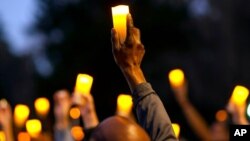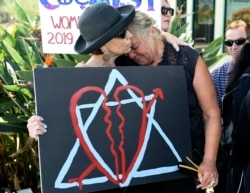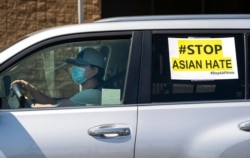In a courtroom in Brunswick, Georgia, three white men face murder and hate crime charges in the killing of Ahmaud Arbery, an African American man who was confronted and shot while jogging in 2020. Last month, a California man was sentenced to life in prison on federal hate crime charges for a deadly shooting spree inside a San Diego synagogue in 2019. Such headline-grabbing cases are just the tip of the iceberg.
The United States recorded nearly 7,500 hate crimes in 2020, the highest level in more than a decade, according to annual statistics released by the FBI. The report, using data from 18,000 law enforcement agencies, noted an increase in assaults targeting Blacks and people of Asian descent. As eye-popping as the yearly total may be, researchers note the vast majority of hate crimes are never reported to police.
"The FBI report is the best national snapshot of violent hate and hate crimes across the country, but it's definitely incomplete," said Michael Lieberman, senior policy counsel with the Southern Poverty Law Center, a civil rights advocacy group. He noted that 70 cities with more than 100,000 people reported zero hate crimes to the FBI.
"That's definitely wrong and there certainly shouldn't be any cities that are not reporting data," Liberman told VOA.
In October, the FBI launched a nationwide awareness campaign to encourage victims and witnesses to report hate crimes to law enforcement.
"Hate-motivated crimes against anyone will not be tolerated by the FBI," Jermicha Fomby, special agent in charge of the Jackson, Mississippi, field office, said in a statement. Advertisements have been posted on billboards and buses across the state on how to report hate crimes.
Mississippi, a Southern state where African Americans constitute 38% of the population, has seen a sharp rise in bias-motivated crimes. Sixty-four incidents were reported in 2020, according to Mississippi law enforcement agencies who reported 14 cases in 2019. The FBI is working closely with state and local police on investigating offenses even when federal charges are not brought in a case.
Hate crimes are defined as offenses motivated by bias based on race, religion, sexual orientation, gender identity or ethnicity.
"The FBI is dedicated to pursuing offenders of these heinous crimes and holding them accountable for their actions," Fomby said. The FBI awareness program, administered from 56 agency field offices across the nation, seeks to boost hate crime investigations and encourage local law enforcement to refer possible federal hate crime cases to the FBI.
"It's a welcome move," said Robert Trestan, regional director with the Anti-Defamation League of New England. Trestan noted in an interview with Reuters there are other challenges in getting people to report misconduct.
"The reporting of hate crimes, unlike other crimes across the country, is not mandatory," he said. Advocates for crime victims maintain that in many cases when wrongdoings are reported, police don't have proper training in making hate crime classifications.
Rising hate
Each year, an average of more than 200,000 hate-fueled incidents are reported to the Justice Department's National Crime Victimization Survey. Meanwhile in 2020, there were 7,426 hate offenses classified as actual crimes against people, an uptick of 25% in the last five years.
FBI data indicate the number of hate-motivated offenses targeting Blacks rose from 1,930 to 2,755. Crimes targeting Asians jumped from 158 to 274. Some researchers believe hate-inspired attacks on Asian Americans grew last year in part as a result of former President Donald Trump's inflammatory remarks blaming the COVID-19 pandemic on China and calling it the "Chinese virus" and "kung flu."
Law enforcement officials also point to a rise in the notoriety of white supremacy groups as a result of events such as the January 6 riot at the U.S. Capitol. Even so, research indicates relatively few bias crimes are committed by white supremacists or by individuals who are acting on behalf of an organized hate group. Research points to a disproportionate number of hate crimes committed by and against juveniles.
Data compiled last February by Reuters showed 11% of Asian Americans had experienced threats or harassment, compared with 8% of African Americans, 6% of Hispanics and 5% of white Americans. The study noted Asian Americans were also twice as likely as whites to have experienced repeated abuse.
"Preventing and responding to hate crimes and hate incidents is one of the Justice Department's highest priorities," U.S. Attorney General Merrick Garland said in a statement. "The FBI Hate Crime Statistics for 2020 demonstrates the urgent need for a comprehensive response."
In May, Garland unveiled federal resources to help state and local police track and investigate hate crimes. The effort also works to expedite a review of hate crimes reported to police.
"Reporting is a two-way street," Lieberman said. "You need to have officers that can identify, report and respond to hate crimes but you need to have victims to have trust in law enforcement in the first place."
He added, "If you're reporting zero hate crimes, you're not instilling trust and faith in the people that live in your city that you're actually going to be able to do anything about a hate crime if it was reported."
Anti-hate crime legislation
Since the federal government established hate crime laws in the 1980s, 46 states and the District of Columbia have adopted laws punishing bias acts and violence against minorities. The only states that don't have hate crime laws are Indiana, Arkansas, South Carolina and Wyoming.
"If you're in Indiana and there's a cross burned on a Black family's lawn that just moved into a previously all white neighborhood, you should be reporting that as a hate crime in addition to trespass or criminal damage to property," Lieberman said.
Across the nation, public opinion surveys suggest a majority of Americans say they are horrified by bias-motivated violence and support hate crime legislation to deter such attacks.
In May, U.S. President Joe Biden signed into law the COVID-19 Hate Crimes Act. The measure includes provisions to combat violence against Asian Americans and increase reporting of hate crimes by offering incentives to law enforcement agencies. It would also set up state telephone hotlines where people can get information about hate crime services.
"Standing against hatred and racism, the ugly poison that has long haunted and plagued our nation, is what brings Americans together," Biden said.
Speaking Thursday at Washington's Martin Luther King, Jr. Memorial, Biden said, "The rise in hate crimes against Asian Americans during the pandemic and the rise of anti-Semitism here in America and around the world — the through line is that hate never goes away, it only hides until someone gives it some breath.
"We cannot and must not give hate any safe harbor," he added.
In addition to stronger laws, victim support groups are calling on police departments to develop specialized units to investigate hate crimes and support victims.
"When hate crimes occur, we need to make sure the perpetrators are found and punished to the full extent of the law," Lieberman said. "Hate crimes are preventable."






